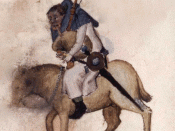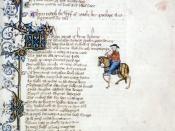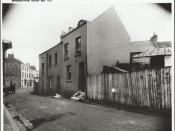One of the most distinguishable points of Chaucer's writing in The Canterbury Tales, is his ability to build a character and then portray that same character through the stories his characters tell. This is exemplified in the tales of the Wife of Bath, the Miller, and the Manciple. Their stories elucidate their personalities and beliefs, whether deliberately or inadvertently.
"She'd had five husbands...apart from other company in youth."(p.31) The prologue more than hints at the Wife of Bath's outlook on life and her own activity. The Wife of Bath was a cultured and tenacious woman of the times. She'd been married five times, traveled the world, and knew exactly what she wanted and almost always got it. In the prologue to her actual tale, she explains each relationship and stands up for herself. It is apparent that at some point she has been condemned for the interesting number of husbands she's taken and asserts that King Solomon had "a thousand wives or so.
And would to God it were allowed to me to be refreshed, aye, half so much as he!...Blessed be God that I have wedded five!" and "Why not marry two or eight?" (p.277) Basically saying that King Solomon had over a thousand wives, and she doesn't even have half as many husbands and God should be thankful for that. She wants constant control over her husbands. "'A man must yield his wife her debt'...What means of paying her can he invent unless he use his silly instrument?" (p.280) The line "...apart from other company in youth," gives the impression that she's had other relationships that were purely physical. She fiercely defends her enjoyment of those physical relationships. "And where did he command virginity?...Tell me what conclusion or in aid of what were generative organs made?...but they were made for both, that is to say both use and pleasure in engendering, except in case of sin." (p.278-280) She doesn't have a problem with people who choose to abstain, but makes the analogy that if that means they are wheat bread, and wives are barley-bread, she'd choose the barley-bread. She doesn't care about being perfect, only about satisfying herself. Her tale models her beliefs in control of men. A knight is convicted of rape and the king who is to decide his fate, is coerced by his wife, the queen, to let her decide the fate of the knight. He must answer the question "What is the thing that women most desire?" (p.301) in a year's time or he will lose his life. In desperation, he promises an old hag anything, in return for the answer. He gives his answer: "A woman wants the self-same sovereignty over her husband as over her lover, and master him; he must not be above her." The role of control over men once again, comes into play. Not only with his answer, but the fact that he had to promise the old hag anything and she had that power over him. He ends up wishing he had never been born, because the old hag wishes to marry him. Eventually, they marry and he can't stand making love with her because of her appearance. She lectures on how rude he is and asks, "Would you rather I were young and pretty and chance your arm what happens in a city where friends will visit you because of me, yes, and in other places too, maybe." (p.309) This implies that because she is old, he'll never be a "cuckold," but if she were vibrant and youthful, she might cheat on him. He lets her decide the role she will play and she is surprised she's won the "mastery."(p.309) Once again, the woman is in a position of power. The Wife of Bath is consistent in her belief that women should be in control of their husbands and lovers, in her own life and ends up in her tale.
The prologue describes the Miller as a hot tempered, dirty drunk and his tale shows it. The prologue to his tale has dialogue in which the host asks him not to tell his tale yet and wait until he's sober. The Miller, being who he is, refuses and tells his tale of debauchery anyway. Nicholas, an astronomer, tells a carpenter that a great flood will come--but there isn't. The town thinks the carpenter's gone mad, what with building rafts and what not. All for the sake of stealing his wife. And at the same time, his wife, Alison, is being admired by Absalon, a parish clerk. He comes to Alison's window one night and says he'll give her a ring in exchange for a kiss. Prior to this Nicholas had stuck his rear -end out of the window to be kissed and expecting the same again, Absalon brings along a hot poker. "But his hot iron was ready; with a thump he smote him in the middle of the rump...Such was the pain, he thought he must be dying." (p.121) Alison and Nicholas conspired and told the town the carpenter was absolutely crazy and spoke of some flood. The tale is funny, yet at some points explicit--but completely what can be expected from a drunken miller.
"Now isn't it a marvel of God's grace that an illiterate fellow can outpace the wisdom of a heap of learned men?" (p.35) Without the rest of his description in the prologue of his great ability to buy when he should buy and his legal talents, this is very true. Out of all the tales, his seems to be the only one that breaks down society into how it really is. Phoebus had a wife that he kept like a caged bird, under lock and key, and when all she wanted was to be free. Oppression almost always guarantees rebellion--which is why she has another man besides Phoebus, and to his insult, he's an ordinary person, a commoner. This is where the Manciple really hits hard about what society thinks of people. "There's no real difference at all between a lady-wife of high degree dishonest of her body, if she be, and some poor wench, no difference but this...That since the gentlewoman ranks above she therefore will be called his 'lady-love', whereas that other woman, being poor, will be referred to as his wench or whore. And as God knows, (and so do you, dear brother) one name is just as low as the other." (p.499) That was as true then as it is now. Being poor brings double judgment it seems. The Manciple doesn't leave out the men here either though. "That just because a tyrant has the might by force of arms to murder men downright and burn down house and home and leave all flat they call the man a captain, just for that. But since an outlaw with his little band cannot bring half such mischief on a land or be the cause of so much harm and grief, he only earns the title of a thief." (p.499) What both of these say is this: In society, if one is well off, or in a position of political power, that person can almost get away unscathed in any situation, or even be hailed for what an ordinary person would be shamed for. This tale truly proved the Manciple's intelligence.
Each of the characters from The Canterbury Tales, showed a hint of their personality, way of living, and style, but the Wife of Bath, the Miller, and the Manciple went beyond that in their tales. The characters in the Wife of Bath's tale had her beliefs shining through them, the Miller's tale showed his foolishness, and the Manciple proved his intelligence.





